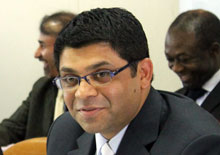ACP preferences to erode as EU trade with third countries thrive
 Brussels, 30 October 2012/ ACP: Trade preferences traditionally enjoyed by the ACP Group from the EU are now under threat, as the major 27-member bloc wraps up even more free trade deals with non-ACP third countries.
Brussels, 30 October 2012/ ACP: Trade preferences traditionally enjoyed by the ACP Group from the EU are now under threat, as the major 27-member bloc wraps up even more free trade deals with non-ACP third countries.
At the ACP-EU Joint Ministerial Trade Committee Meeting on 26 October, Fiji’s Minister of Industry & Trade Mr Aiyaz Sayed Khaiyum affirmed that preference erosion was a major concern for many African, Caribbean and Pacific (ACP) states, which have benefited from a privileged partnership with the EU for decades.
“Looking at some of the Free Trade Agreements (FTAs) that have been agreed between the EU and other parties, we have identified textiles and clothing, tuna loins and canned tuna, bananas, sugar, rum, palm oil and cut flowers as products that have suffered or are likely to suffer from preference erosion. We still maintain that it is necessary carry out an impact study on these products,” said Mr Sayed Khaiyum.
Co-chairing the meeting, European Commission’s Trade Commissioner Mr Karel De Gucht noted that as the world’s largest trading bloc, the EU could not be expected to limit preferential trade to ACP countries. Ambitious FTA deals such as the EU-Central America Association Agreement and the EU-Colombia-Peru Multi-Party Trade Agreement were already signed in June.
Meanwhile, negotiations between the EU and Mercosur region, Malaysia, India, Singapore and other Asian countries are ongoing. Mr De Gucht assured ACP partners that so far, trade has been liberalised only partially – through quotas or reduced tariffs – or gradually, over a couple of years, to take account of ACP interests.
The Commissioner assured that the EU was willing to help its partners adjust to new trend in trade liberalisation. Still, the ACP side further urged the Commission to take all measures to dull the negative effect of the new FTAs on ACP countries.
With the banana trade for instance, the EU-Central America and EU-Colombia-Peru deals would reduce customs duties to €75 per tonne in 10 years – down from €176 at the time of the 2009 Geneva Agreement on Trade in Bananas, which set duties at €114 by 2019 at the latest.
“It is worth noting that these new concessions jeopardise the balance sought in the Geneva Agreement on Trade in Bananas, and completely nullifies some of the benefits that ACP countries could have gained from the EPAs,” Mr Sayed Khaiyum argued.
ACP countries would then have to offset, within a limited 10-year period, a total loss in competitiveness of €140 – €240 per tonne.
However, the also added that preference erosion is “unavoidable” given current economic trends. Said Mr Sayed Khaiyum: “The ACP countries are committed do their utmost to address the deep-rooted causes of their lack of competitiveness. We call on the EU to support us on this front.”
He insisted that ACP interests be protected as much as possible in accordance with the 2010 Cotonou Agreement.
(Photo: Co-Chair of the 11th ACP-EU Joint Ministerial Trade Committee Meeting, Attorney General and Minister for Industry and Trade of Fiji, Aiyaz Sayed Khaiyum)
– ACP Press
